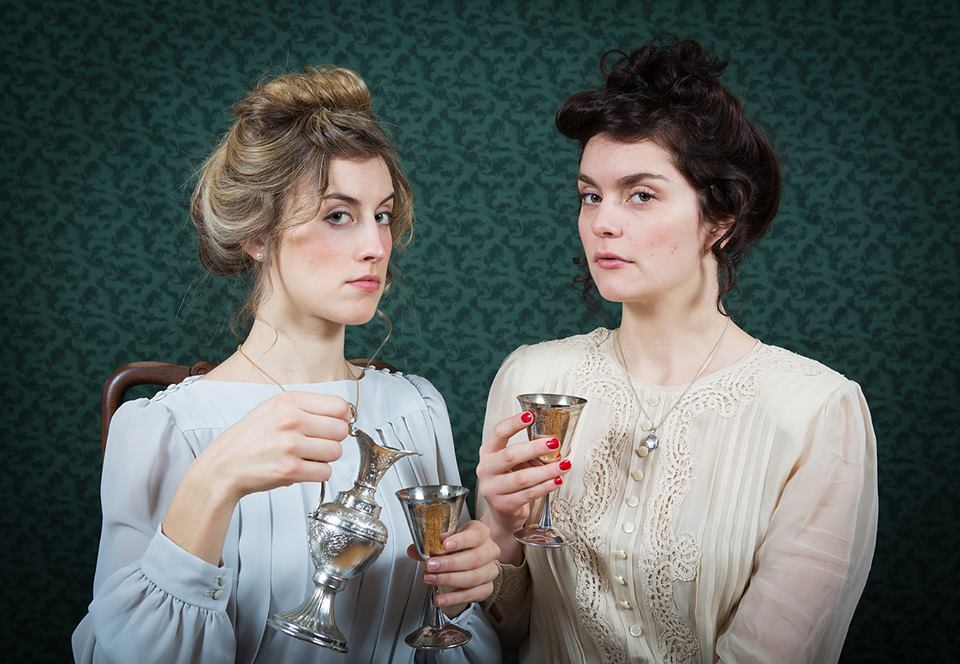In the comedic short “Peter ’N Chris Come to Dinner,” two 20-something guys venture over to the apartment of Gwynne Phillips and Briana Templeton for a double date. But the lovely evening tailspins into a nightmare as the perfect hostesses become unhinged: They’ve put framed pictures of the men on the buffet table. Padlocks appear on the door. The ladies have even written the guys’ names across the ravioli. (Is it written in tomato sauce? Or blood?) “We have to leave,” whispers Chris. “Right now, right now, right now.”
In the dark comedy of Phillips and Templeton – known as the sketch duo Templeton Philharmonic – the woman who hides demented rage is a recurring one. “We are always trying to push boundaries. Most of our characters are women who are complex and have a dark secret that they’re trying to conceal. They are, on the surface, very put together – but there’s something very odd going on beneath,” says Phillips (BA 2009 St. Mike’s). Adds Templeton (BA 2009 Woodsworth): “The pressure to keep up appearances to the nth degree can be ripe for comedy, even if it comes out as a dark statement. It’s something that we’ve found a lot of our audience members can connect with.”
The duo’s surreal sketch comedy had its debut at the Montreal Fringe Festival in 2011. What followed were comedic period pieces such as “Sockdolager,” a 1920s murder-mystery staged at Campbell House Museum in Toronto; appearances at comedy clubs throughout North America (they have won the Best Comedy Duo Award at the L.A. Comedy Festival); and writing and starring roles in CBC’s “Womanish,” a web series that follows the social and professional goings-on of two roommates in Toronto. The comedians came up with the name Templeton Philharmonic during a panicked, last-minute application to the Montreal Fringe Festival. They wanted to incorporate both their names – but “Templeton Phillips sounded too much like a law firm,” says Templeton. “We thought it would be fun to create something oh-so-snobby, with maybe a Victorian-inspired vibe. Templeton Philharmonic sounded really self-aggrandizing, which we thought would be fun.”
The roots of their twisted comedy began at U of T: The two met while taking classes in the University College Drama Program. In the summer of final year, the senior class headed over to Milan and created I Heart Future, an experimental play centred on Italian futurism and modern technology. They performed at a festival at the Piccolo Theatre: Phillips and Templeton created a scene about genetic modification, during which they danced in gold leotards to O Mio Babbino. “That was the first sketch technically that we ever wrote – but we didn’t really realize it was a sketch,” says Phillips of the tongue-in-cheek piece. After graduation, they decided to work together and focus on comedy. “I don’t think either of us was necessarily planning to get into live comedy, but it ended up being a space that seemed useful for us, and a lot of fun,” adds Templeton.

Along with their theatre experience, their comedic work is largely inspired by strange, twisted movies – the weirder, the better. The Italian film genre Giallo – thrillers and horrors that often include supernatural elements – is a favourite, because “they’re just so heightened and dramatic and ridiculous,” says Phillips. They also have a penchant for North American horror classics, such as Rosemary’s Baby, The Omen and The Stepford Wives. “Any type of governess thriller movie is right up our alley,” she adds.
Right now, the duo is currently writing for CBC’s “The Irrelevant Show” and will be performing a new sketch-comedy revue at this summer’s Toronto Fringe Festival. Their video “Baby Shower Ladies” was also recently accepted into the National Screen Institute – Canada Short Film Festival. (The video features yet another complicated woman: a pregnant guest of honour who, during idle chit-chat, gives indications that her child just might be the anti-Christ.)
The comedians point out that their sketches are often set in different eras; ricocheting from the Victorian era, to the ’70s, and back again. Part of the reason they do this is aesthetic: “We get to nerd out by designing a lot of vintage clothes,” says Templeton. But the other is because it allows them to create heightened versions of reality – much like the Italian films they love. “When we set different sketches in the past, something becomes amplified. The costumes become even more amped up, and the type of distress or issues the characters are facing and trying to cover up becomes greater as well,” adds Phillips. “That’s where the comedy comes in.”






